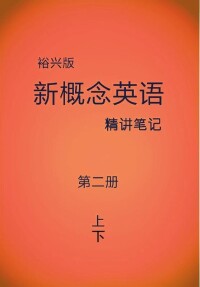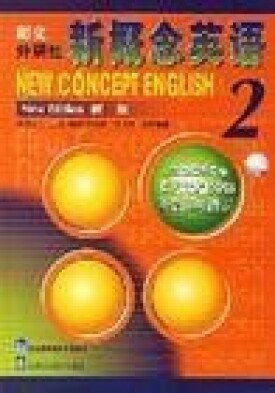新概念英語第二冊
亞歷山大、何其莘合著的書籍
新概念英語第二冊《實踐與進步》(Practice and Progress)是新概念英語系列的其中之一。同時也是《新概念英語青少版》4級、5級的藍本。
| 書名:新概念2 | 定價: 38.9元(普通版),68元(點讀版) |
| 作者:亞歷山大(L.G.Alexander)(英),(HE QIXIN)何其莘 | 出版社:外語教學與研究出版社 |
| ISBN: 7-5600-1347-3 | 出版時間: 1997年10月(第1版) |
| 類別:英語教材 | 裝幀:平裝 |
| 頁數: 440 | 開本: 787×1092 1/16 |
新概念英語(New Concept English),是英國路易·亞歷山大(Louis G.Alexander)1967年專為非本族的中學和成年學習者編寫的一套英語課本。全套共四冊:新概念英語第一冊《英語初階》 (First Things First),新概念英語第二冊《實踐與進步》(Practice and Progress),新概念英語第三冊《培養技能》(Developing Skills),新概念英語第四冊《流利英語》(Fluency in English)。四冊科學地融合了聽、說、讀、寫、譯五方面的技能,從初級、預備中級、中級,直到高級,由淺入深,前後互相銜接。
各冊的共同特點是:
1)不重傳授抽象知識,而重培養實際運用英語的技能;
2)分為許多分量適中的單元,循序小步前進,學習起來困難小,用力省,收效顯著;
3)聽、說、讀、寫四會並重,全面訓練;
4)兼顧趣味和實用,課文短小精悍,語言自然地道,內容生動有趣;練習精當,富於針對性。
新概念英語第一冊以對話為主,明快上口;
新概念英語第二、三冊以短篇故事為主,活潑幽默,耐人尋味;
新概念英語第四冊都是原著文章選段,體裁多樣,題材廣泛。
由於具有以上特點,《新概念英語》自1976年由英國朗曼公司(Longman Group Limited)出版以來,受到許多國家和地區廣大英語學習者和教師的歡迎。
《新概念英語第二冊》旨在全面訓練學生的4項技能、理解、口語、閱讀、寫作。使學生具有使用語言的能力。一般來說,具有以下知識便可進入《新概念英語第二冊》的學習。
1、動詞be與have現在時與過去時的基本用法。
2、現在進行時,能夠識別並懂得如何構成。
3、一般現在時:能夠識別;懂得動詞第3人稱單數上添加-s, -es, 或 -ies後綴。
4、一般過去時:能夠識別並會運用常見的規則動詞與不規則動詞的一般過去時形態。
5、過去進行時:能夠識別。
6、現在完成時(一般):能夠識別。
7、過去完成時:能夠識別。
8、將來時:能夠認識並運用going to, shall與will構成將來時。
9、助動詞:can, may與must的基本用法;能夠識別could, might與would的形式。
10、能夠用do/does/did等助動詞造疑問句與否定句;能運用疑問代詞與副詞。
11、能夠回答以助動詞與疑問詞開頭的問句。
12、副詞:能夠用-ly與-ily後綴組成副詞;能夠識別well, hard, fast等特例。
13、冠詞:定冠詞與不定冠詞。懂得a/an/the的基本用法;some, any, no, much, many, a lot of 接可數、不可數名詞的用法。
14、名詞:能夠用-s, -es,-ves後綴組成名詞複數形式;會用常見的不規則複數形式:men, women, children, teeth r等形式。
15、代詞:人稱代詞、所有格代詞、反身代詞;所有符號“'”加s('s)。
16、形容詞:基本用法;規則的比較級;不規則的比較級:good, bad, much與little.
17、介詞:常見的地點、時間、方位介詞的用法。
18、關係代詞:能夠識別並使用who/whom, which/that。
19、this/that; these/those。
20、省略形式:it's, I'm, isn't, didn't等。
21、There is/it is; there are/they are。
22、祈使句。
23、一周7天的名稱、日期、季節、數字、時辰(今天、昨天、明天等)。
24、報時。

新概念英語第二冊

新概念英語第二冊
1、為完成初級水平英語學習的成年學習者和中學生提供的一本教材。
2、全面訓練學生的4項技能:理解、口語、閱讀、寫作——按此順序進行訓練。從這方面來講,這本教材準備做兩件事:為聽/說練習提供適合的材料,同時,這些材料也可用於系統地訓練學生的寫作能力。
3、為學生提供一本令他能夠使用語言的教材。
4、為教師提供配合得當、循序漸進的教材,使他們在上課前只需做極少的準備。由於許多練習有“自動糾錯”的功能,因此,教師也就相應的免去了批閱大量書面練習的負擔。
5、為教師和學生提供一本單卷本的教材,而不必增加“練習手冊"。
6、為今後準備參加諸如劍橋初級證書考試的學生打下一個基礎。必須認識到這個目標與訓練學生的4項語言技能的主要目標是一致的。
7、為教師提供可在課堂使用的錄音材料,學生也可以在家中使用。然而,必須強調的是,這不是一本全面供自學使用的教程。從根本上來說,這是一本供課堂使用的教材,但其錄音材料也可以在家裡使用。錄音練習是補充課堂教學而準備的。
本教材應能適用於:
1、已經學完初學者綜合教材《英語初階》或者其他任何一種初級教程的成年人或者中學生。
2、需要補課的學生,即在學校曾經學過英語,現在又想重新撿起來的人;英語中途而廢而終未學成者。
3、那些由於學生上課出勤率不高、英語起步較晚而造成“損失”的中學以及語言學校。本教材的設計使那些學習有困難或者上課時斷時續的學生能夠趕上他們落下的課程。
4、學完初級課程后又想自學的學生。
本書對於必不可少的語法知識(關鍵句型)與慣用法中的語言難點加以區分。對語法的講解不準備面面俱到。關鍵句型和難點中的所以材料均取自於各篇課文,語法術語一概棄之不用。新的語法現象以句型的形式進行介紹。在必須解釋的地方,就讓學生將新的語法現象同已經學過的語法現象聯繫起來做比較,並列舉大量的實例,而不做抽象的講解或搬出“語法規則”。
填空練慣用以鞏固學生口頭學或練習過的句型,不能用來教授新的語言現象。還有大量回顧練習,要求學生在做這些練習時將語言難點同自己熟悉的課文進行對照。這種語法練習是在有語境的真實的上下文中出現,而不是一些互不相關的句子。學生通過對照課文,可以立即發現自己是否已經掌握了一種新的句型,老師也可以省去批改這類作業的麻煩,因為在大多數情況下,課文為他代勞了。
關鍵句型的安排方式是本教材最重要的特色之一。關鍵句型是以一種或許可以稱為“同心圓”的方法進行介紹的。其基本構想是,凡要引入新的概念,必須要同學生已經學過的知識聯繫起來。這種同心圓式的安排使學生可以不斷地複習一些最為困難的句型。這點看了下列要點即可明白:
第1單元(1-24課):關鍵句型以初級難度材料介紹。
第2單元(25-45課):同樣的關鍵句型重新出現,材料難度略微加深。
第3單元(49-72課):同樣的關鍵句型再度出現,材料難度進一步加深。
第4單元(73-96課):複習上述關鍵句型。

新概念英語第二冊
書名:裕興新概念英語第二冊筆記
頁數:846頁
課數:96課
頁面大小:32開
字體:簡體中文版
新概念英語第二冊中共有96課。
課文標題如下
| Lesson 1A private conversation 私人談話 | Lesson 2 Breakfast or lunch? 早餐還是午餐? | Lesson 3 Please send me a card 寄張明信片 | Lesson 4 An exciting trip 激動人心的旅行 |
| Lesson 5 No wrong numbers 無錯號之虞 | Lesson 6 Percy Buttons 珀西·巴頓斯 | Lesson 7 Too late 為時太晚 | Lesson 8 The best and the worst 最好的和最差的 |
| Lesson 9 A cold welcome 冷遇 | Lesson 10 Not for jazz 不適於演奏爵士樂 | Lesson 11 One good turn deserves another 禮尚往來 | Lesson 12 Goodbye and good luck 再見,一路順風 |
| Lesson 13 The Greenwood Boys 綠林少年 | Lesson 14 Do you speak English? 你會講英語嗎? | Lesson 15 Good news 佳音 | Lesson 16 A polite request 彬彬有禮的要求 |
| Lesson 17 Always young 青春常駐 | Lesson 18 He often does this! 他經常幹這種事! | Lesson 19 Sold out 票已售完 | Lesson 20 One man in a boat 獨坐孤舟 |
| Lesson 21 Mad or not? 是不是瘋了? | Lesson 22 A glass envelope 玻璃信封 | Lesson 23 A new house 新居 | Lesson 24 It could be worse 不幸中之萬幸 |
| Lesson 25 Do the English speak English? 英國人講的是英語嗎? | Lesson 26 The best art critics 最佳藝術評論家 | Lesson 27 A wet night 雨夜 | Lesson 28 No parking 禁止停車 |
| Lesson 29 Taxi! 出租汽車! | Lesson 30 Football or polo?足球還是水球? | Lesson 31 Success story 成功者的故事 | Lesson 32 Shopping made easy 購物變得很方便 |
| Lesson 33 Out of the darkness 衝出黑暗 | Lesson 34 Quick work 破案“神速” | Lesson 35 Stop thief! 捉賊! | Lesson 36 Across the Channel 橫渡海峽 |
| Lesson 37 The Olympic Games 奧林匹克運動會 | Lesson 38 Everything except the weather 唯沒考慮天氣 | Lesson 39 Am I all right? 我是否痊癒? | Lesson 40 Food and talk 進餐與交談 |
| Lesson 41 Do you call that a hat? 你把那個叫帽子嗎? | Lesson 42 Not very musical 並非很懂音樂 | Lesson 43 Over the South Pole 飛越南極 | Lesson 44 Through the forest 穿過森林 |
| Lesson 45 A clear conscience 問心無愧 | Lesson 46 Expensive and uncomfortable 既昂貴又受罪 | Lesson 47 A thirsty ghost 嗜酒的鬼魂 | Lesson 48 Did you want to tell me something? 你想對我說什麼嗎? |
| Lesson 49 The end of a dream 美夢告終 | Lesson 50 Taken for a ride 乘車兜風 | Lesson 51 Reward for Virtue 對美德的獎賞 | Lesson 52 A pretty carpet 漂亮的地毯 |
| Lesson 53 Hot snake 觸電的蛇 | Lesson 54 sticky fingers 粘糊的手指 | Lesson 55 Not a gold mine 並非金礦 | Lesson 56 Faster than sound! 比聲音還快! |
| Lesson 57 Can I help you, madam? 您要買什麼,夫人? | Lesson 58 A blessing in disguise? 是因禍得福嗎? | Lesson 59 In or out? 進來還是出去? | Lesson 60 The future 卜算未來 |
| Lesson 61 Trouble with the Hubble 哈勃望遠鏡的困境 | Lesson 62 After the fire 大火之後 | Lesson 63 She was not amused 她並不覺得好笑 | Lesson 64 The Channel Tunnel 海峽隧道 |
| Lesson 65 Jumbo versus the police 小象對警察 | Lesson 66 Sweet as honey! 像蜜一樣甜! | Lesson 67 Volcanoes 火山 | Lesson 68 Persistent 糾纏不休 |
| Lesson 69 But not murder! 並非謀殺! | Lesson 70 Red for danger 危險的紅色 | Lesson 71 A famous clock 一個著名的大鐘 | Lesson 72 A car called Bluebird “藍鳥”汽車 |
| Lesson 73 The record-holder 紀錄保持者 | Lesson 74 Out of the limelight 舞台之外 | Lesson 75 SOS 呼救信號 | Lesson 76 April Fools' Day 愚人節 |
| Lesson 77 A successful operation 一例成功的手術 | Lesson 78 The last one? 最後一枝嗎? | Lesson 79 By air 乘飛機 | Lesson 80 The Crystal Palace 水晶宮 |
| Lesson 81 Escape 脫逃 | Lesson 82 Monster or fish? 是妖還是魚? | Lesson 83 After the elections 大選之後 | Lesson 84 On strike 罷工 |
| Lesson 85 Never too old to learn 活到老學到老 | Lesson 86 Out of control 失控 | Lesson 87 A perfect alibi 極好的不在犯罪現場的證據 | Lesson 88 Trapped in a mine 困在礦井裡 |
| Lesson 89 A slip of the tongue 口誤 | Lesson 90 What's for supper? 晚餐吃什麼? | Lesson 91 Three men in a basket 三人同籃 | Lesson 92 Asking for trouble 自找麻煩 |
| Lesson 93 A noble gift 崇高的禮物 | Lesson 94 Future champions 未來的冠軍 | Lesson 95 A fantasy 純屬虛構 | Lesson 96 The dead return 亡靈返鄉 |
(註:《新概念英語青少版》學生用書4、5級根據本書改編,但5A中的第13單元課文與原版第61課不同,青少版中相應的內容為《Bad Language 壞話連篇》。)
New Words and Expressions
☆private adj.私人的
如果媽媽想看你的信,你可以說:It's my private letter.
如果陌生人想進你的房子,你可以說:It's my private house.
private life 私生活
由此引申出privacy n.隱私
新動力是private school(私立學校),與此相反,公立學校是public school.所以,private的反義詞是public.
eg.public 公眾;public letter 公開信;public place 公共場所
private還有一個值得注意的意思:普通的。
如:private citizen 普通公民;private soldier 大兵
我們熟悉的《拯救大兵瑞恩》就是《Private Ryan》
☆conversation n.談話
subject of conversation 話題。(天氣是英國人最喜愛的話題)
幾種談話:
talk 內容可以正式,也可以私人
conversation 一般用於正式文體中,內容上往往不正式
dialogue 對話,可以指正式國家與國家會談。
eg.China and Korea are having a dialogue.
chat 閑聊,就是北京人說的“侃”,說的是無關緊要的事。
gossip 嚼舌頭,說長道短
用法:have a +...
☆theatre n.劇場,戲劇
[記憶]cinema 電影院
☆seat n.座位
這個詞很重要,考試常考。
have a good seat,這裡的seat指place,而不是chair。
take a seat/take your seat 坐下來,就坐
下面這個句子在口語、電影里很常見:Is the seat taken?
請坐的3種說法:
Sit down,please.(命令性)
take your seat,please.
Be seated,please.(更禮貌)
考點:作為動詞的seat與sit的區別
sit--vi; seat--vt
seat sb 讓某人就坐
When all those present___he began his lecture.(D) (重點題)
A.sit B.set C.seated D.were seated
A,B改為sat就對了
☆angry adj.生氣的
cross=angry
☆attention n.注意
Attention,please.
pay attention 注意
pay attention to 對……注意
pay a little/much/more/no attention
☆bear(bore,boren) v.容忍
忍受的幾種說法:bear,stand,endure,put up with
bear->stand->endure 忍受的極限在擴大
pur up with=bear=stand
bear n.熊
give sb a bear hug 給某人熱情(熱烈)的擁抱
☆business n.事,生意
business man 生意人 do business 做生意
go to some place on business 因公出差
business:某人自己的私人的事情
thing:可以指事情,也可以指東西
☆go to the+地點:表示去某地幹嘛
go to the cinema=see a film
go to the +人+'s:表示去這個人開的店
go to the doctor's 去看病
go to the butcher's 買肉
go to the dairy(奶品店)
go to +地點:去某地做相關的事
go to school 去上學; go to church 去做禮拜; go to hospital 去看病 go home 回家休息
[注]跟home相連一定表示沒有事情可做,休閑
☆enjoy
enjoy oneself 玩得開心
enjoy+sth 喜歡(從中得到一種享受) (後面不能加人)
I enjoy the music/book/dinner/film/program.
☆過去進行時態:過去的某個時間正在發生的動作
一個故事的背景往往用進行時態描述。
eg.The girl was reading a book in the garden.A boy came to her.
☆got 變得
I am/was angry.(是個事實)
I got angry.(強調變化過程)
got取代be動詞。got是半聯繫動詞,可以直接加形容詞。
☆說話的時候喜歡用縮略:I'm not,he isn't,they aren't
寫的時候會說:I am not,he is not,they are not
☆hear:聽見 hear+人:聽見某人的話
I couldn't hear you.Beg your pardon?
I couldn't hear a word.(誇張)
I couldn't catch your words.
a word 等於一句話
eg.He didn't say a word.
May I speak to Jim?=May I have a word with Jim?
untilprep.直到
outsideadv.外面[補充:還可以做prep.向……外的adj.外部的n.部]
outside sider 門外漢
ringv.(鈴、電話)響 [補充:還可以做n.環狀物 ↓vi.門鈴,電話
give somebody a ring
auntn.姑,姨,嬸,舅母[補充:uncle姑父 niece侄女 cousin堂弟 nepnen侄子]
repeatv.重複
Never too old to learn. 活到老學到老。
There's no such thing as a free lunch.天下沒有免費的午餐。
what a day!多麼糟糕的天氣!這是一個省略感嘆句。完整的句子為what a day it is!
eg:what a brave boy ( he is)!
How+形容詞+主語+謂語
eg :how brave the boy is!
虛擬語氣:
eg: if the houses of parliment had not been burned down, Big Ben would never have been buit .
